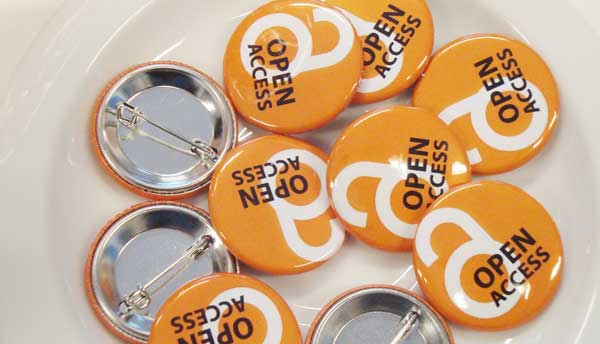
[Image above] The Department of Energy is providing public access to research it funds in a new online portal. Credit: biblioteekje; Flickr; CC BY-NC-SA 2.0
I’ve never been great at sharing.
As the oldest sibling and the only girl, I never had to share clothes, toys, or a room like my twin brothers did.
Sharing, however, is something I continue to work on—something I’ve been working on since I met my first college roommate. Sharing space, sharing ideas, sharing feelings are all processes in process, the progress of which have only been accelerated since acquiring my first roommate (my husband) after 10 years of living alone.
Similarly, sharing is something we often do—begrudgingly or not—in the professional world.
The photos we include in our CTT blog posts (such as the one at the top of this post) are licensed under Creative Commons Licenses (CCL). There are differing types of licenses—what you can and cannot modify, how you can and cannot use an image—but the common thread between these common licenses is that the creator retains copyright while still allowing others to copy, distribute, and make non-commercial use of their work.
Likewise, open access publishing applies a CCL to scholarly articles and publications, allowing researchers to freely distribute their work online while granting others to use that work just as freely.
The issue of open access is a constant and often contentious debate at universities, research labs, and publishing houses around the world—and consistently a topic of conversation on social networks and other online forums.
We won’t settle that debate today, or likely anytime soon, but the Energy Department is taking steps toward a more open stream of information from the lab, introducing a new web directory that increases access to any publications or data derived from research funded by the DOE.
According to a DOE release, the department’s Public Access Gateway for Energy and Science (PAGES) portal provides free public access to accepted peer-reviewed manuscripts or published scientific journal articles within 12 months of publication.
“Increasing access to the results of research funded by the DOE will enable researchers and entrepreneurs to capitalize on our substantial research and development investments,” says Energy Secretary Ernest Moniz. “These new policies set the stage for increased innovation, commercial opportunities, and accelerated scientific breakthroughs.”
Though PAGES is still in beta (i.e., more to come), it is expected to will eventually include “distributed all-access text access to all DOE-affiliated accepted manuscripts or articles” and increase its information assets by 20,000-30,000 manuscripts or articles each year. The articles currently available are only a collection to demonstrate functionality and the content that will eventually be made available, says the DOE.
But that’s not all.
The department’s Office of Science has handed down new requirements (read them here)—to be included in all funding solicitations and invites as of October 1—for the “management of digital research data” by researchers it supports, including the submission of a data management plan for all funding proposals. The plan must detail how researchers will share and preserve the data they collect.
The new publishing portal and regs—a response to a 2013 mandate from the White House to provide access to research funded by the federal government—have been met with mixed reactions.
“The DOE plan is a mixed bag in terms of ease of access,” says Heather Joseph, executive director of the Scholarly Publishing and Academic Resources Coalition in a statement. “While we applaud DOE for providing access to its articles through a variety of locations, including its own Agency database, through institutional repositories, as well as via publisher websites, the plan misses crucial opportunities. The establishment of the PAGES portal provides a first step towards locating DOE articles on these distributed web sites. However, we are concerned that the plan places too strong an emphasis on defaulting to versions of articles residing on publishers’ websites, where terms and conditions of use may be restricted. SPARC encourages DOE to ensure that articles are deposited into repositories immediately upon publication and are made available via channels where their reuse can be fully leveraged.”
(You can read her statement in full here.)
What do you think of the DOE’s plans—Is this a step back for open access or simply a step in the right direction?

